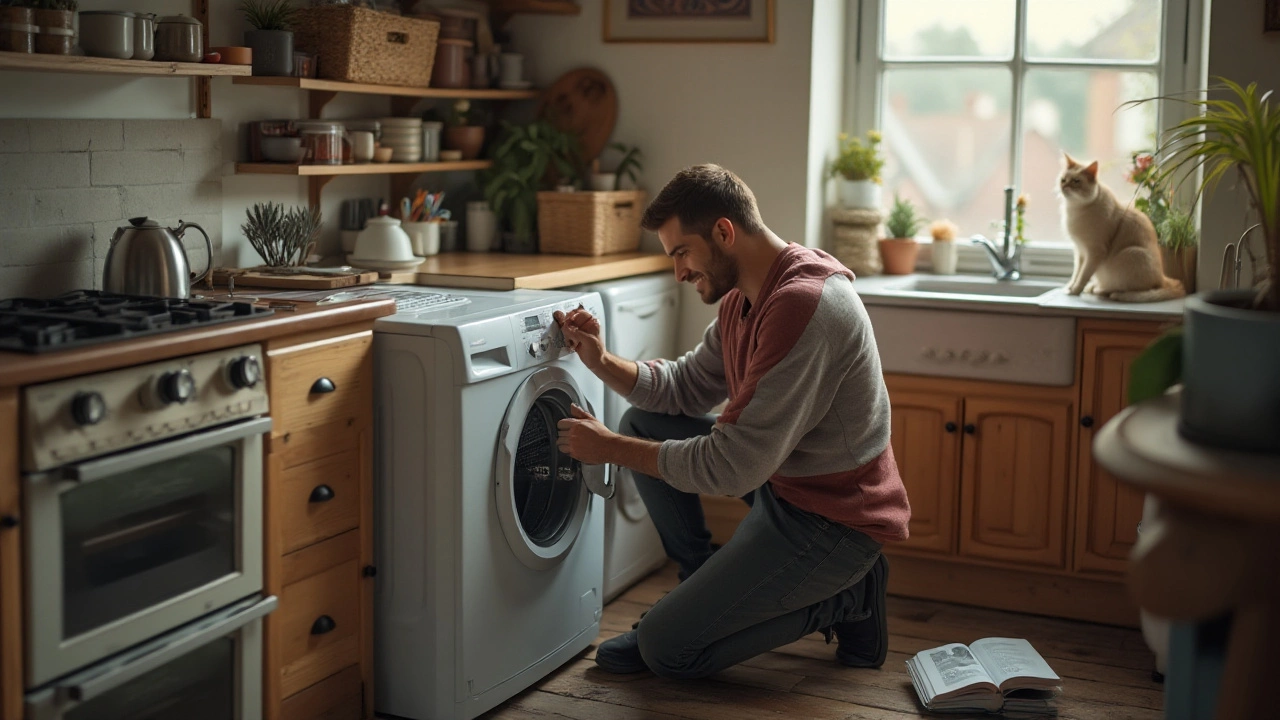Got a kitchen gadget that’s acting up? You don’t always need a pro – a few simple repair skills can save you time and money. Below you’ll learn the basics you need to tackle the most common problems with ovens, washing machines, heat pumps and more, all without fancy jargon.
Before you start, gather a basic toolbox: a set of screwdrivers (flat‑head and Phillips), adjustable pliers, a multimeter, and a flashlight. A pair of insulated gloves and safety glasses are a must; electricity and moving parts can surprise you if you’re not careful. Always unplug the appliance or shut off its circuit breaker – it’s the quickest way to avoid shocks.
Knowing how to read a simple wiring diagram can also help. Most appliances have a label inside the back panel that shows where each wire goes. Keep a photo of the original setup before you disconnect anything – a quick snap on your phone makes reassembly painless.
Electric oven that won’t heat: First, check the heating element with a multimeter for continuity. If it reads zero, the element is dead and needs swapping. Removing it is usually just a few screws and a connector. While you’re there, give the oven interior a good clean – baked‑on grease can cause temperature sensors to misread.
Washing machine leaks: Most leaks come from a worn door gasket or a cracked hose. Inspect the rubber seal for tears and replace it with a new one that snaps right into place. For hose issues, tighten the clamps or replace the hose entirely; it’s cheap and takes minutes.
Heat pump not blowing warm air: Start by checking the outdoor fan – a blocked grill or bent blade can stall airflow. Clear debris, spin the fan by hand, and make sure it runs freely. Next, test the thermostat setting and the refrigerant pressure if you have a gauge; low pressure usually means a leak that needs a professional, but a dirty filter is a quick win.
Kitchen extractor fan noisy or weak: Remove the cover and clean the fan blades and motor housing. Dust buildup reduces airflow and creates rattles. If the motor still sounds rough after cleaning, lubricate the bearings with a few drops of oil or replace the motor if it’s old.
These fixes cover the majority of everyday breakdowns. When you finish, double‑check each connection, run a short test cycle, and make sure everything works before you pack the tools away.
Remember, the goal isn’t to become a full‑time technician – just to handle the simple stuff confidently. If a problem feels beyond your comfort zone, such as a refrigerant leak or a gas boiler issue, call a qualified expert. Knowing when to stop is as important as knowing how to start.
With a handful of tools, a bit of patience, and the right repair skills, you’ll keep your home running smoothly without the hassle of constant service calls. Keep this guide handy, and the next time something misbehaves, you’ll already have a plan.

Repairing a washing machine yourself can save time and money, and it's not as difficult as one might think. This article covers the basic steps for diagnosing common issues, tools required for repairs, and safety tips to consider. Whether it's a noisy drum or a leaking gasket, we guide you through essential troubleshooting techniques. Learn how to tackle minor fixes and decide when to seek professional help.

Learn how often to flush your water heater, why it matters, signs it's time, mistakes to avoid, and simple steps to, maintain hot water at home.

Discover the workings of a hob, a crucial kitchen fixture that often gets overlooked until it malfunctions. Learn the common issues that can affect its performance and get handy tips on basic repairs and maintenance. Whether you're dealing with burner problems or electrical faults, this guide provides practical advice to keep your hob in top shape. Understand the typical lifespan of these appliances and how to extend it through regular care.

Stuck with a broken extractor fan and not sure what to do next? This article gives you practical ideas for improving air flow in your kitchen or bathroom when the fan is out of action. Learn about effective ways to keep humidity, smells, and condensation under control using simple tools and habits. Discover the pros and cons of each alternative solution so you can pick what fits your place best. Skip the stress and get the facts on dealing with bad ventilation the easy way.

Experiencing a sudden loss of hot water can be inconvenient and potentially alarming. Understanding common reasons for this issue, such as thermostat malfunctions or a broken heating element, can help you troubleshoot the problem. Sometimes the solution is as simple as relighting the pilot light or adjusting the thermostat settings. For more complex issues, professional repair might be necessary. This article provides insightful tips and practical information to help you get your hot water flowing again.

Curious if you can fix your dishwasher without calling a pro? This article breaks down the most common dishwasher problems and explains which repairs you can actually do yourself. We’ll cover how complicated these appliances really are, how to figure out what’s wrong, the tools you’ll need, and which jobs might leave you better off calling an expert. Get practical tips, interesting facts, and a clear picture of what you’re actually signing up for before grabbing that toolbox.